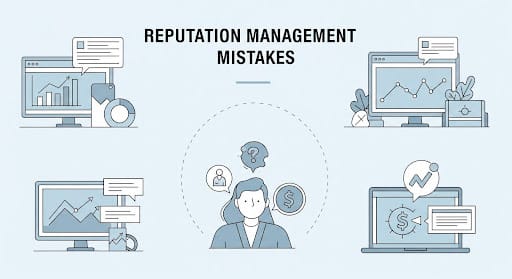Your online reputation can make or break your success, whether you’re an individual professional or a business owner. Understanding how to manage your digital presence is crucial. Here are ten common reputation management mistakes you need to avoid to maintain a positive online image.
1. The Silent Treatment: Ignoring Negative Reviews
One of the biggest mistakes organisations make is turning a blind eye to negative reviews. When you ignore criticism, you’re not just missing an opportunity to address concerns – you’re sending a message that you don’t care about customer feedback. Instead, respond promptly and professionally to all reviews, showing your commitment to customer satisfaction and continuous improvement.
2. Social Media Oversharing: The Balance Between Transparency and Privacy
While transparency builds trust, oversharing on social media can damage your reputation. Be strategic about what you post. Share content that adds value and aligns with your brand values, but avoid controversial topics or personal information that could be misinterpreted or misused.
3. Fake Reviews and False Testimonials
Creating fake reviews or testimonials might seem like a quick fix, but it’s both unethical and illegal. Not only can this practice result in hefty fines, but it can also permanently damage your credibility when discovered. Focus on earning genuine positive reviews through excellent service instead.
4. Crisis Management: The “Wait and See” Approach
Waiting until a crisis hits to develop a management strategy is a recipe for disaster. Every business needs a proactive crisis management plan. This includes monitoring your online presence, preparing response templates, and having a dedicated team ready to handle reputation threats.
5. Defensive Responses to Criticism
Responding emotionally or defensively to negative feedback can escalate situations unnecessarily. Train your team to respond with empathy, professionalism, and a solution-oriented mindset. Remember, how you handle criticism often matters more than the criticism itself.
6. The Delete and Deny Strategy
Deleting negative comments or reviews might seem like an easy solution, but it often backfires. This practice can appear dishonest and may encourage critics to post their complaints on platforms you can’t control. Instead, address concerns openly and constructively.
7. Neglecting Your Digital Footprint
Your online presence requires regular monitoring and maintenance. Set up Google Alerts for your brand name, regularly review your social media presence, and conduct periodic audits of your online reputation. Prevention is always better than a cure.
8. Content Inconsistency Across Platforms
Maintaining a consistent brand voice across all platforms is crucial. Inconsistent messaging can confuse your audience and damage your credibility. Develop clear brand guidelines and ensure all team members understand and follow them.
9. Poor SEO Practices
Keyword stuffing and other black-hat SEO tactics can hurt your search engine rankings and reputation. Focus on creating high-quality, valuable content that naturally incorporates relevant keywords and meets your audience’s needs.
10. Lack of a Recovery Plan
Every organisation should have a comprehensive reputation recovery plan. This includes strategies for addressing negative content, building positive content, and maintaining communication with stakeholders during challenging times.
Conclusion
Managing your online reputation requires constant attention, strategic thinking, and a commitment to authenticity. By avoiding these common mistakes and implementing proper reputation management strategies, you can build and maintain a strong, positive online presence that supports your long-term success.
Need professional help managing your online reputation? Contact our team of experts today to learn how we can help you build and maintain a positive digital presence.

